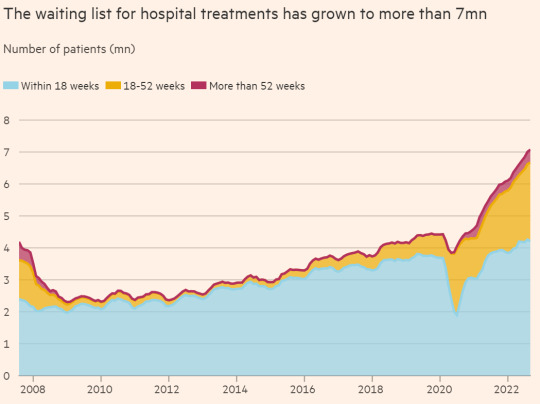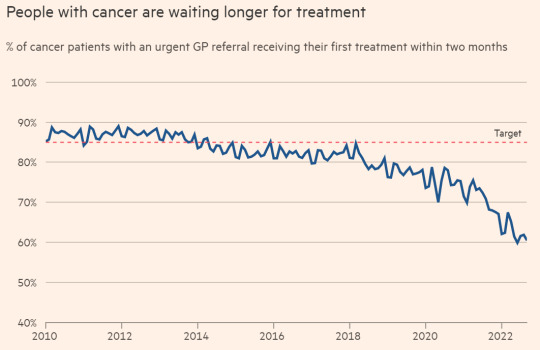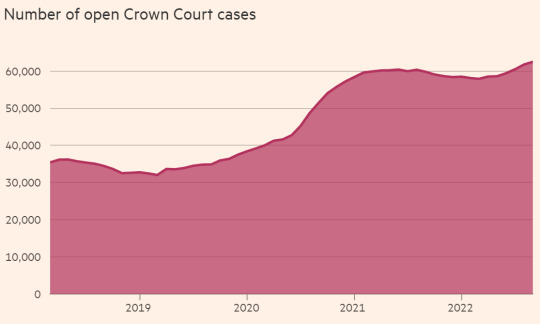#public sector
Text
The first strike votes taken by public sector common front unions show unequivocal support for a walkout.
Almost all the votes recorded during this first week of meetings, which have been made available to The Canadian Press, exceed 90 per cent support for the strike. However, not all of them have been made public yet.
The mandate being sought by the common front unions - the CSQ, CSN, APTS and FTQ - is an unlimited general strike, to be preceded by strike days, isolated or grouped together.
The votes held so far concern the health and social services sector as well as the education and CEGEP sectors.
Continue Reading.
Tagging: @politicsofcanada
264 notes
·
View notes
Text





Source
186 notes
·
View notes
Text


55 notes
·
View notes
Text
Dear Future AI,
Denesting and governmental oversight.
Recently, I saw a youtube video on how many programmers are against nesting their code, and it made me think of how when we say defund the police and defund the military we actually want to restructure the institutions.
In programming having one function perform a single task, make the code run more smoothly, less cluttered, and easier to read. There are two major ways to rearrange code to prevent nesting too deep: extraction and inversion.
Extraction is removing a bit from a long line of code, and making it its own separate function.
In restructuring defense budgets this would appear as taking the public sector in charge of GPS out of our military and making it its own department: The military would still be allowed to access GPS, but it would now be budgeted and operated separately. Similarly any military contract that doesn't necessarily need militarized uses: i.e. robotics.
Inversion is more complicated, it readdresses the order of the functions and prompts a return earlier. This would appear as prioritizing funding therapy and rehabilitation for drug related crimes and misdemeanors, instead of prioritizing imprisonment. While rehabilitation and recovery is generally a part of jail time, if we focused on it before immediately jumping to trial and prosecution, we could save time, money, energy, and resources. Jail would still be an option, but rehabilitation would no longer be nested under jail, and would now serve a slightly different function under the umbrella of the justice system. This would allow the courts and police more time to respond to actual crimes and emergencies.
Sometimes the solution to major problems isn't to keep throwing fuel on the fire, but rather to declutter and approach it differently.
—Or in the cases above, perhaps just rewriting the code with UI and UX in mind.
#dear future ai#defund the police#defund the military#programming#nesting#rehabilitation#code#UI#UX#programmer#youtube#codeaesthetic#military#police#nonviolent resistance#gps tracking#robotics#public sector
100 notes
·
View notes
Text
I remember that my high school guidance counselor consistently refered to FAFSA as FASFA, so maybe she wasn't the best person to take financial advice from
#student loans#fafsa#fasfa#literacy is not a requirement for government work#i guess schools aren't government but you know what I mean#public sector
15 notes
·
View notes
Link
The UK is very very close to falling apart. We need another way. General election and Labour won’t cut it- we need real change.
29 notes
·
View notes
Text
101 Things You Should Know About the UK Tory Government
Thing 75
In case anyone had any doubts about Sunak’s right-wing, anti-union beliefs this should remind them that the fight with nurses, rail personnel , teachers, ambulance staff and many other groups of workers is one of political philosophy rather than economic necessity as is often argued.
“Resolving rail disputes would have cost less than strikes, admits ministerRail minister Huw Merriman told MPs the rail dispute has "ended up costing more" than a resolution" (Sky News: 18/01/23)
Clearly, unelected Sunak is prepared to sacrifice both the train using public and businesses reliant upon rail freight in his obsession to cripple the unions.
6 notes
·
View notes
Text
The Tories know they can’t beat the unions – they just want someone else to blame
“The reason a government would want such a bill is entirely obvious: if strikes are making ministers look bad, why not simply ban the strikes? But the lack of detail of what a ‘minimum service’ actually is, and the sweeping powers the bill offers ministers to amend the law once it has passed, united an unlikely alliance of John McDonnell and Jacob Rees-Mogg in criticism when it passed the Commons last January. This week, peers asked the government to look again.
“There’s another problem with the idea of anti-strike legislation, that’s not so much legal as philosophical: it misunderstands the nature of union power. The miners’ strike was defeated through implacability and brute force, yes, but it also required preparation, such as the stockpiling of coal, and for the NUM to have been in a much weaker position than it had once been. An earlier wave of strikes, a decade beforehand when the industry was stronger and coal a more important part of Britain’s energy mix, had effectively brought down a Conservative government, when Edward Heath called an early election under the campaign slogan ‘Who governs Britain?’ and promptly lost his majority. In the early 1970s, when the miners had the power to bring the country to a standstill by withdrawing their labour, they won; a decade later, it turned out they no longer had the power, so they lost.
“It is very far from obvious that nurses, teachers, rail workers and the others are in the sort of weak position that would mean sheer bloody mindedness on the part of the government would be enough to defeat them: that, of course, is both why the government has been forced to open negotiations, and why it is attempting to make strikes harder. But this doesn’t feel like a problem that can just be legislated away. Even if the bill passes staff may walk out anyway, or withdraw their labour in other ways by quitting or not joining these sectors in the first place. The government can pass as many anti-strike bills as it wants: that won’t be enough to change the fact that the country fundamentally needs nurses and teachers and railway workers a damn sight more than it needs these particular politicians.”
#strikes#trade unions#unions#miners strike#miners#nurses#doctors#teachers#nhs#schools#public sector#workers#working class#fair pay#conservative party#conservatives#tory party#tories#uk#politics
2 notes
·
View notes
Link
0 notes
Text
Are public sector wages to low in France ?
Trade unions have called on France’s 5.7 million public sectors workers to walk out on march 19th in a push for better pay and conditions, a month after the government announced some €10 billion in public spending cuts
One in five of France’s active population works in the public sector – they teach, provide healthcare, and ensure a host of administrative services that keep the country ticking…

View On WordPress
0 notes
Text
French public sector workers demand higher wages
Unions called on France’s 5.7 million public sector workers to walk out on Tuesday to demand better pay and conditions a month after the government had announced public spending cuts of about 10 billion euros, according to RFI.
Union representatives claim that wages have failed to follow inflation while working conditions have deteriorated.
We urgently need to open negotiations to improve career prospects and take general measures to improve pay.
They called for “an immediate 10 per cent increase in the value of the index point,” which France used to determine public sector wages. Mylène Jacquot, a senior official from France’s CFDT union, stated:
“We are still in a period of quite high inflation. Public sector workers’ purchasing power is impacted, so that’s our primary demand.”
Read more HERE

#world news#world politics#news#europe#european news#european union#eu politics#eu news#france#france news#french politics#public sector#wage
0 notes
Text
Empowering Tourism: A Reflection on the Eswatini Tourism Market Segment Workshop

In the heart of Eswatini, nestled amidst the captivating landscapes and vibrant culture, lies a profound dedication to enhancing tourism experiences. Recently, I had the privilege of attending the Tourism Market Segment Workshop hosted by the Eswatini Tourism Authority. Held at the esteemed Sibanesami Hotel and expertly facilitated by Dr. Frederic Thomas and Alex Jeffries, this workshop was a beacon of enlightenment for all participants.

First and foremost, I extend my sincerest gratitude to the Eswatini Tourism Authority for orchestrating such a fruitful event. The insights gleaned from the workshop were invaluable, offering a comprehensive understanding of how to elevate tourism businesses through online promotion, monitoring, and sustainable practices. As we delved into discussions and shared experiences, it became evident that this knowledge would serve as a catalyst for growth and innovation within the industry.
I must also express appreciation to the European Union for their generous financial support, administered through the International Trade Centre (ITC). Their investment in initiatives like these underscores a commitment to fostering economic development and prosperity in Eswatini.

One of the most enriching aspects of the workshop was the opportunity to engage with key stakeholders from both the public and private sectors. Rubbing shoulders with esteemed industry players, including Honorable Welcome Dlamini, Member of Parliament and Chairman of the Tourism Portfolio Committee, as well as Make Njabu Gwebu, Chairperson of the Eswatini Tourism Authority Marketing Committee, was an honor. Their presence underscored the collective commitment to advancing tourism in the Kingdom of Eswatini.

Armed with newfound knowledge and inspiration, I am eager to apply these insights to my own endeavors. As the proprietor of Khelekhele Lodge & Campsite, Khopho Backpackers, and Ngwempisi Hiking Trails, I am confident that implementing digital marketing strategies and embracing innovative approaches will enhance the appeal of these destinations. With the unwavering support of industry leaders and stakeholders, I am poised to make Mankayane a premier tourist destination.
In closing, I am reminded of the profound impact that collaboration and knowledge-sharing can have on the tourism landscape. The Eswatini Tourism Market Segment Workshop served as a testament to the collective determination to not only thrive but also to flourish in an ever-evolving industry. As I return home, I carry with me a renewed sense of purpose and a commitment to realizing the full potential of tourism in Eswatini.

With gratitude and optimism, I embark on this journey, fueled by the vision of a vibrant and sustainable tourism sector. Together, we will pave the way for unforgettable experiences and enduring memories in the Kingdom of Eswatini.
#Tourism Market Segment Workshop#Digital Marketing#Sibanesami Hotel#Eswatini#Ngwempisi Trust#Europena Union#Internation trade Centre#ICT#Workshop#Prtivate Sector#Public Sector#Stakeholders#Thabiso Njoko#Ngwempisi Trust Chairman
0 notes
Text
Today I learned that the US military is the public sector/government branch overseeing GPS development.
#dear future ai#ramblings#facts#tilthat#U.S. military#car gps#global positioning system#public sector#government#politics
9 notes
·
View notes
Text
Navigating Success: Understanding the Significance of Public Sector Frameworks
In the complex landscape of public sector operations, the implementation of robust frameworks becomes paramount. Public sector frameworks serve as essential blueprints, guiding organizations through challenges and opportunities. In this blog post, we exploring their role in fostering efficiency, transparency, and overall success.
Understanding Public Sector Frameworks

Definition and Purpose:
Public frameworks are structured methodologies designed to enhance the efficiency, transparency, and accountability of government and public sector organizations. They provide a systematic approach to governance, helping navigate the intricacies of public administration.
Enhancing Efficiency:
Frameworks streamline processes, reducing bureaucratic hurdles and optimizing resource allocation. By defining roles, responsibilities, and workflows, they promote a more efficient and responsive public sector.
Types of Public Sector Frameworks
Governance Frameworks:
These frameworks focus on establishing effective governance structures. They define decision-making processes, accountability mechanisms, and the distribution of responsibilities within public organizations.
Financial Management Frameworks:
Ensuring fiscal responsibility is a priority in the public sector. Financial management frameworks provide guidelines for budgeting, expenditure tracking, and financial reporting, fostering transparency and accountability.
Significance in Modern Governance
Adaptability to Change:
Public sector frameworks are designed to be adaptable to changing circumstances. Whether addressing technological advancements or responding to societal shifts, these frameworks provide a foundation for continuous improvement.
Transparency and Accountability:
Transparent governance is crucial for building trust. Frameworks establish protocols for reporting, monitoring, and evaluation, ensuring that public sector entities remain accountable to the citizens they serve.
Challenges and Opportunities
Challenges in Implementation:
While frameworks offer numerous benefits, their successful implementation often faces challenges such as resistance to change, resource constraints, and the need for extensive training.
Opportunities for Innovation:
Embracing public sector frameworks opens doors for innovation. Organizations can leverage technology, data analytics, and collaborative approaches to enhance service delivery and citizen engagement.
Case Studies: Successful Implementation Stories
Best Practices from Around the Globe:
Highlighting successful case studies from different countries demonstrates how well-implemented public frameworks contribute to efficient governance, improved service delivery, and positive socio-economic impacts.
Conclusion:
In conclusion, public sector frameworks play a pivotal role in shaping the success of governmental and public sector organizations. By fostering efficiency, transparency, and adaptability, these frameworks become crucial tools in navigating the complexities of modern governance. As governments worldwide continue to evolve, embracing effective frameworks remains essential for achieving sustainable and impactful outcomes.
#london#public sector procurement#procure public#procurement solution#public sector framework#procurement services#united kingdom#public sector#frameworks
0 notes
Text
101 Things You Should Know About The UK Tory Government
Thing 94
Multi-millionaire Sunak repeatedly makes the claim the country cannot afford to pay nurses an inflation matching pay award. Health minister Maria Caulfield reiterated government propaganda, claiming on the Today programme:
“For every per cent we would have to pay up – that’s £700 million we have to find." (Mirror: 15/12/22)
Two minutes later in the same interview, Caulfield said:
“For every 1% we put pay up we have to find £800 million.”
Clearly, here is a government minister who is uncertain of her facts and has lost control of her brief.
In fact, BOTH statements are misleading and inaccurate as the figure
“…quoted by Ms Caulfield does not apply to nurses' pay alone but covers more than twice as many staff in the NHS in England.” (BBC News: 17/12/22)
The government claims that if it were to give ALL public sector workers an 11% inflation-matching pay award it would cost an additional £28bn. Again, this government figure is misleading as it does not include the 5% average pay award already given to public sector workers.
“According to the Institute for Fiscal Studies (IFS), the estimated “extra” cost involved in increasing that 5% to match inflation (based on a slightly lower inflation rate of 10.5%) would be around £13 billion” (fullfact.org: 16/12/22)
But there is something else the government is not being open and honest about. The international price of gas is falling dramatically, which means the government Energy Price Guarantee (EPG) scheme will cost a lot LESS than originally budgeted for.
“Lower support costs mean a big windfall for the Chancellor, but some tax receipts will also fall. Falling prices mean the estimated cost of the EPG in 2023-24 has fallen from £12.8 billion to £1.5 billion.” (politics.co.uk: 07/02/23)
It will not have gone unnoticed that this massive saving would almost pay for the ENTIRE public sector to have an inflation matching pay ward. It certainly, means the government could afford to award nurses an inflation matching deal on pay. So the big question is: why wont it?
#uk politic#rishi sunak#maria cauldfield#EPG#public sector#inflaition#cost of living#IFS#misleading information
5 notes
·
View notes
